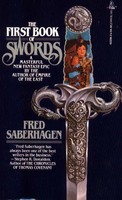
| Series: | Swords #1 |
| Publisher: | Tor |
| Copyright: | 1983 |
| Printing: | April 1984 |
| ISBN: | 0-812-55343-8 |
| Format: | Mass market |
| Pages: | 309 |
I originally read Saberhagen's epic fantasy series in an weird order. The first book I found was The Third Book of Swords, I read all of the Swords books first, and then I read Empire of the East, which Saberhagen wrote first and which sets the background for the world. I wouldn't recommend reading the Swords series out of order — this is the book to start with there — but I'm still torn on whether to read Empire of the East first. On one hand, reading the earlier book first explains much of the world background and is a more natural reading. On the other hand, I thought Empire of the East was more fun to read later as an explanation of some of the mysteries from the Swords series.
Whichever way you get here, the Swords series is a great example of gadget fantasy, fantasy written partly from a hard SF direction. The foundation of Saberhagen's world, as one discovers early in the book, is that the gods have created twelve magical swords as part of some type of obscure game that they're playing. Each sword has a different set of powers, some good and some bad, which are explained in short bits of verse (some better than others) collected at the end of the book and occasionally mentioned in the midst of it. While there's more of this in later books than in this first one, the plot already often revolves around figuring out how to trigger the swords, mistaking them for each other, and losing one and finding another.
In short, this is fantasy with clear rules and without much of the mystical side of magic. It is, in that sense, not high fantasy; it has more in common with Larry Niven's magic stories. There are, however, some major mysteries apart from the swords: the gods who made the swords and who seem to be Roman gods have lots of power but don't seem to have the proper credentials to really be who they claim. Draffut, the Beastlord, shows up as a mysterious shaggy giant with unknown but clearly benign motives (his role is much clearer to Empire of the East readers). There also is some regular magic, unrelated to the swords, which isn't quite so deterministic and gadget-based. But the swords reign supreme.
Unfortunately, this is obviously the first book of a trilogy. Much of it introduces the concept of the swords, including a telling of their origin, and then follows Mark in his initial escape with Townsaver. Saberhagen spends quite a bit of time setting up the world and with wandering about the world with Townsaver and Dragonslicer. The climax at the end of the book is clearly little more than a preliminary battle with no lasting significance, and tons of plot elements are left up in the air (most importantly, Draffut). Saberhagen introduces a masked figure who plays a significant role in several key scenes, but any coherent information about him is left for later books. It's all very unsatisfying, particularly given the amount of the book spent faffing about with Dragonslicer, the least interesting of all twelve swords. And of course, most tellingly, only four of the swords show up.
Saberhagen's characters are functional for the plot but not particularly distinguished. Mark and Nestor are a bit interchangable, Barbara is unfortunately a non-entity, Ben has none of the depth he gains in later stories, and the good and evil characters are painfully apparent and not very complex. The strength of this series is the swords and their interactions, but one doesn't see enough of them in this book to really enjoy. That leaves Draffut as the best part of the book, and while I do like Draffut and Saberhagen has a decent grasp of pacing, this is the weakest book of the series. One mostly reads it as an introduction to the better later books of the series.
Followed, predictably, by The Second Book of Swords.
This edition of this book ends with an essay by Sandra Miesel on Saberhagen's world-building and some of the underlying themes of The First Book of Swords. I didn't find the analysis that deep or compelling (and she's amusingly wrong about some things revealed in later books), but if one isn't familiar with Saberhagen's writing, it's not a bad introduction. It does somewhat spoil Empire of the East, though, so don't read it before you've read that book.
Reviewed: 2007-05-28